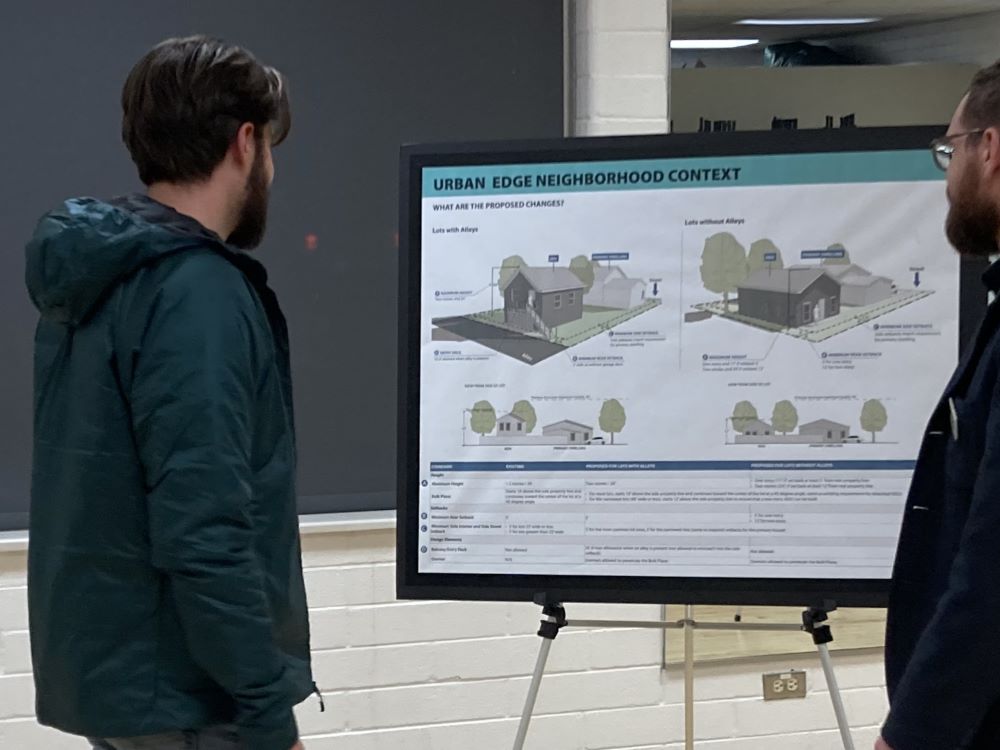By Celeste Benzschawel
Although several neighborhoods in northwest Denver have been rezoned to allow the construction of accessory dwelling units (ADUs), homeowners still face several regulatory barriers to building them.
Properties zoned to allow for the construction of ADUs must consider adequate setbacks, building height limits, minimum lot size requirements, maximum square footage, reuse of existing accessory structures (when applicable), and owner occupancy, among other factors.
After nearly a year of researching how Denver could make it easier for property owners to add the additional dwelling structures to their land, the city recently drafted a recommended strategy to amend the zoning code. People can submit comments to the recommendations until Feb. 24 on the city’s website under the Community Planning and Development’s ADU page.

The effort is a follow-up to Blueprint Denver, a citywide land use plan from 2019 that addressed barriers to building ADUs. This project will not change where they are allowed or rezone any properties but is intended to make it easier to build them. The goal of having more ADUs is to provide housing for family members and contribute to affordable housing.
Councilwoman Candi CdeBaca, of District 9, said she is in favor of rezoning the entire city for ADUs, but changing the zoning to allow for larger units could be hampering. She said some ADUs that have already been built are larger than the existing primary units in the GES neighborhoods.
“It’s just so financially not feasible for our community. Um the only people who are asking for are much higher income individuals than you typically have here in our neighborhood,” CdeBaca said.
CdeBaca said while ADUs could help certain areas of the city, there are concerns she had with increasing density of the supplemental residences.
“We’ve already got (residential) speculators trying to buy our houses every single day,” she said. “I think that that would increase that pressure coming from real estate speculators.” Laura Swartz, communications director for the Denver Community Planning and Development department (CPD), provided data on how many ADUs have been built in the last few years.
Since 2020, 178 permits have been issued in the city of Denver and 88 units have been built.
2020 – 53 permits issued, 37 built
2021 – 62 permits issued, 43 built
2022 – 60 permits issued (one was withdrawn, one was canceled), 8 built
2023 – 3 permits issued, 0 built (as of January 2023)
At an open house at the Swansea Recreation Center, senior city planner Josh Palmeri said the barriers primarily hamper construction and increase the cost to build, which in total can cost hundreds of thousands of dollars. Additionally, these requirements currently follow a one-size-fits-all framework for building ADUs.
The zoning code amendment recommendations aim to fit ADUs into a variety of neighborhoods. Abe Barge, a Denver code and regulation supervisor, identified lot size and building coverage requirements as the most restrictive barriers.
According to the strategy report, the lot an owner wants to build on must meet or exceed a minimum zone lot size based on their district. If their property is smaller than the requirement, that means they can’t build. The new recommendations propose that the lot size requirement be removed citywide. Maximum building coverage is the maximum amount of a lot that can be covered by any structures.
Smaller lots allow a max of 50% coverage, while most other lots are maxed out at 37.5%. If the lot has an ADU, the coverage can exceed that 37.5% only if at least 80% of the gross floor area on the ground level of the ADU is used for vehicle storage.
Essentially that limits owners to building the livable part of an ADU on top of a large garage. The recommendation is to extend the building coverage exemption from garages to detached ADUs citywide, which will then allow single-story ADUs to be built.
Councilwoman Amanda P. Sandoval, who led the charge on the first larger zoning efforts to allow ADUs, said there are many factors that go into changing the zoning.
“There are other factors such as interest rates that play a huge factor on this,” Sandoval said. “With interest rates as high as they are, it’s super challenging for people to be able to assume that type of debt. I’m hoping this will have a pretty good impact on some of the issues that our constituents in northwest Denver have encountered when attempting to build an accessory dwelling unit. Does it get to everything? No. Is it a good place to start? Yes.”
Other recommendations include making the permitting process easier and reducing related fees for applying to connect water and sewer lines . Sandoval said these are contributing factors that make building ADUs cost-prohibitive.
Draft recommendations will likely be presented to the Denver Planning Board in early April, said Genevieve Morton, marketing and communications specialist at CPD. After that, staff members hope it will move to the City Council in early June.
Eric Heinz contributed to this report.

Be the first to comment